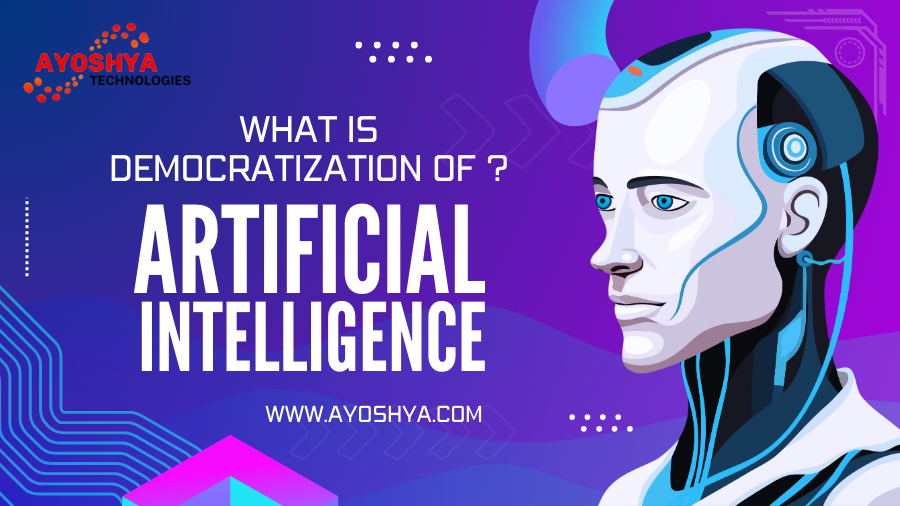What is democratization of AI?
Imagine a world where artificial intelligence (AI) isn’t just the playground of tech giants and scientific elite. A world where anyone, from budding entrepreneurs to passionate educators, can wield the power of algorithms to solve problems, ignite creativity, and shape a better future. This isn’t a futuristic fantasy; it’s the burgeoning movement known as the democratization of AI.
This in-depth blog delves deep into the heart of this transformative phenomenon, exploring its principles, potential pitfalls, and the exciting possibilities it holds for individuals, businesses, and society as a whole. So, buckle up, grab your curiosity, and prepare to unlock the magic of AI for everyone.
Decoding the Slogan: What Does Democratization of AI Actually Mean?
Before we dive headfirst into the technological torrent, let’s establish a clear understanding of this buzzword:
The democratization of AI refers to the broadening access and usability of AI tools and resources for a wider audience beyond the confines of specialized laboratories and tech corporations. It’s about breaking down the barriers of entry, empowering individuals and organizations without extensive technical expertise to leverage the power of AI for their own purposes.
Beyond Buzzwords: The Pillars of Democratic AI
This movement rests upon several key pillars:
- User-friendly AI platforms and tools: Gone are the days of cryptic code and impenetrable algorithms. Democratization necessitates user-friendly platforms with intuitive interfaces, drag-and-drop functionality, and visual workflows, making AI accessible even to novices.
- Open-source software and resources: Sharing knowledge and tools is crucial for fostering innovation and inclusivity. Open-source libraries, datasets, and code repositories empower individuals and organizations to learn from each other and build upon existing projects.
- Cloud-based computing: Expensive hardware and computational power should not be an obstacle to exploring AI. Cloud-based platforms democratize access to advanced computing resources, enabling anyone with an internet connection to experiment and innovate.
- Focus on education and training: Democratization requires more than just tools; it demands widespread education and training to equip individuals with the skills and knowledge to understand, apply, and ethically utilize AI.
From Theory to Reality: Unleashing the Potential of Democratic AI
Now, let’s step into the vibrant arena where this democratization is playing out:
- Entrepreneurship: Imagine small businesses crafting personalized marketing campaigns or analyzing customer data with readily available AI tools, giving them a fighting chance against larger competitors.
- Education: Picture classrooms where students use AI-powered tutors to receive personalized learning experiences, unlocking their full potential regardless of individual learning styles.
- Healthcare: Envision doctors leveraging AI algorithms to analyze medical scans, diagnose diseases with greater accuracy, and personalize treatment plans, delivering better outcomes for patients.
- Environmental Solutions: Imagine researchers utilizing AI to analyze climate data, predict natural disasters, and develop sustainable solutions, protecting our planet for future generations.
Navigating the Challenges: Obstacles on the Path to Democratization
While the possibilities are boundless, the road to democratic AI is not without its challenges:
- Bias and Ethics: Unchecked AI algorithms can perpetuate existing biases and lead to discriminatory outcomes. Addressing bias and ensuring ethical development and deployment of AI is crucial.
- Job displacement: Concerns about AI automating jobs and rendering human workers obsolete are valid. Open discussions and proactive upskilling initiatives are essential for mitigating these risks.
- Data Privacy and Security: Protecting personal data used in AI applications is paramount. Robust security measures and data governance regulations are needed to ensure trust and responsible use.
- Digital Divide: Access to technology and resources is not distributed equally. Bridging the digital divide and ensuring inclusive access to AI opportunities is critical for true democratization.
A Call to Action: Building a Future Powered by Inclusive AI
The democratization of AI is not just a technological trend; it’s a transformative opportunity to empower individuals, reimagine industries, and create a more equitable and sustainable future. By embracing its principles, addressing its challenges, and nurturing a culture of collaboration and ethical innovation, we can unlock the true potential of AI for the benefit of all.
Join the movement, champion inclusive AI education, advocate for responsible development, and help build a future where the magic of AI is not the exclusive domain of the few, but a tool for progress and empowerment for all.
You may be interested in:
Oracle Online: Navigating the Digital Realm of Database Excellence
Demystifying Approaches to Artificial Intelligence



